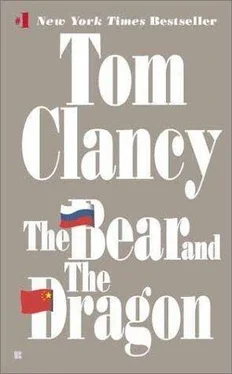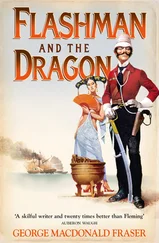Tom Clancy - The Bear and the Dragon
Здесь есть возможность читать онлайн «Tom Clancy - The Bear and the Dragon» весь текст электронной книги совершенно бесплатно (целиком полную версию без сокращений). В некоторых случаях можно слушать аудио, скачать через торрент в формате fb2 и присутствует краткое содержание. Год выпуска: 2001, ISBN: 2001, Жанр: Триллер, на английском языке. Описание произведения, (предисловие) а так же отзывы посетителей доступны на портале библиотеки ЛибКат.
- Название:The Bear and the Dragon
- Автор:
- Жанр:
- Год:2001
- ISBN:780425180969
- Рейтинг книги:3 / 5. Голосов: 1
-
Избранное:Добавить в избранное
- Отзывы:
-
Ваша оценка:
- 60
- 1
- 2
- 3
- 4
- 5
The Bear and the Dragon: краткое содержание, описание и аннотация
Предлагаем к чтению аннотацию, описание, краткое содержание или предисловие (зависит от того, что написал сам автор книги «The Bear and the Dragon»). Если вы не нашли необходимую информацию о книге — напишите в комментариях, мы постараемся отыскать её.
The Bear and the Dragon — читать онлайн бесплатно полную книгу (весь текст) целиком
Ниже представлен текст книги, разбитый по страницам. Система сохранения места последней прочитанной страницы, позволяет с удобством читать онлайн бесплатно книгу «The Bear and the Dragon», без необходимости каждый раз заново искать на чём Вы остановились. Поставьте закладку, и сможете в любой момент перейти на страницу, на которой закончили чтение.
Интервал:
Закладка:
“Humble ourselves before them?”
“Yes, Zhang. We need what they have, and to get it, we must be acceptable to them.”
“And when they next demand that we make political changes, then what?” This was the premier, Xu, getting somewhat agitated, which was unusual for him.
“We face such decisions when and if they come,” Qian answered, pleasing Fang, who didn’t want to risk saying that himself.
“We cannot risk that,” the Interior Minister, Tong Jie, responded, speaking for the first time. The police of the nation belonged to him, and he was responsible for civil order in the country-only if he failed would he call upon Marshal Luo, which would cause him both loss of face and loss of power at this table. In a real sense, the deaths of the two men had been laid at his place, for he had generated the formal orders on the suppression of religious activity in the PRC, increasing the harshness of law enforcement in order to increase the relative influence of his own ministry. “If the foreigners insist upon internal political changes, it could bring us all down.”
And that was the core issue, Fang saw at once. The People’s Republic rested absolutely upon the power of the party and its leaders, these men before him in this room. Like noblemen of old, each was attended by a trusted servant, sitting in the chairs against the wall, around the table, waiting for the order to fetch tea or water. Each had his rationale for power, whether it was Defense, or Interior, or Heavy Industry, or in his particular case, friendship and general experience. Each had labored long and hard to reach this point, and none of them relished the thought of losing what he had, any more than a provincial governor under the Ching Dynasty would have willingly reverted to being a mere mandarin, because that meant at least ignominy, and just as likely, death. These men knew that if a foreign country demanded and got internal political concessions, then their grip on power would loosen, and that was the one thing they dared not risk. They ruled the workers and peasants, and because of that, they also feared them. The noblemen of old could fall back upon the teachings of Confucius, or Buddha; on a spiritual foundation for their temporal power. But Marx and Mao had swept all that away, leaving only force as their defense. And if to maintain their country’s prosperity they had to diminish that force, what would then happen? They didn’t know, and these men feared the unknown as a child feared the evil monsters under his bed at night, but with far more reason. It had happened, right here in Beijing, not all that many years before. Not one of these men had forgotten it. To the public, they’d always shown steadfast determination. But each of them, alone in his bathroom before the mirror, or lying in bed at night before sleep came, had shown fear. Because though they basked in the devotion of the peasants and workers, somehow each of them knew that the peasants and workers might fear them, but also hated them. Hated them for their arrogance, their corruption, for their privilege, their better food, their luxurious housing, their personal servants. Their servants, they all knew, loathed them as well, behind smiles and bows of obeisance, which could just as easily conceal a dagger, because that’s how the peasants and workers had felt about the nobles of a hundred years before. The revolutionaries had made use of that hatred against the class enemies of that age, and new ones, they all knew, could make use of the same silent rage against themselves. And so they would cling to power with the same desperation as the nobles of old, except they would show even more ruthlessness, because unlike the nobles of old, they had no place to run to. Their ideology had trapped them in their golden cages more surely than any religion could.
Fang had never before considered all of these thoughts in toto. Like the others, he’d worried a lot when the college students had demonstrated, building up their “goddess of liberty” out of plaster or papier-mâché-Fang didn’t remember, though he did remember his sigh of relief when the PLA had destroyed it. It came as a surprise to him, the realization of how snared he was here in this place. The power he and his colleagues exercised was like something shown before a mirror that could be turned on them all instantly under the proper circumstances. They had immense power over every citizen in their country, but that power was all an illusion-
— and, no, they couldn’t allow another country to dictate political practices to them, because their lives all depended on that illusion. It was like smoke on a calm day, seemingly a pillar to hold up the heavens, but the slightest wind could blow it all away, and then the heavens would fall. On them all.
But Fang also saw that there was no way out. If they didn’t change to make America happy, then their country would run out of wheat and oil, and probably other things as well, and they would risk massive social change in a grounds well from below. But if to prevent that, they allowed some internal changes, they would just be inviting the same thing on themselves.
Which would kill them the more surely?
Did it matter? Fang asked himself. Either way, they’d be just as dead. He wondered idly how it would come, the fists of a mob, or bullets before a wall, or a rope. No, it would be bullets. That was how his country executed people. Probably preferable to the beheading sword of old. What if the swordsman missed his aim, after all? It must have been a horrid mess. He only had to look around the table to see that everyone here had similar thoughts, at least those with enough wit. All men feared the unknown, but now they had to choose which unknown to fear, and the choice was yet another thing to dread.
“So, Qian, you say we risk running out of things because we can no longer get the money we need to purchase them?” Premier Xu asked.
“That is correct,” the Finance Minister confirmed.
“In what other ways could we get money and oil?” Xu asked next.
“That is not within my purview, Chairman,” Qian answered.
“Oil is its own currency,” Zhang said. “And there is ample oil to our north. There is also gold, and many other things we need. Timber in vast quantities. And that which we need most of all-space, living space for our people.”
Marshal Luo nodded. “We have discussed this before.”
“What do you mean?” Fang asked.
“The Northern Resource Area, our Japanese friends once called it,” Zhang reminded them all.
“That adventure ended in disaster,” Fang observed at once. “We were fortunate not to have been damaged by it.”
“But we were not damaged at all,” Zhang replied lightly. “We were not even implicated. We can be sure of that, can we not, Luo?”
“This is so. The Russians have never strengthened their southern defenses. They even ignore our exercises that have raised our forces to a high state of readiness.”
“Can we be sure of that?”
“Oh, yes,” the Defense Minister told them all. “Tan?” he asked.
Tan Deshi was the chief of the Ministry of State Security, in charge of the PRC’s foreign and domestic intelligence services. One of the younger men here at seventy, he was probably the healthiest of them all, a nonsmoker and a very light imbiber of alcohol. “When we first began our increased exercises, they watched with concern, but after the first two years, they lost interest. We have over a million of our citizens living in eastern Siberia-it’s illegal, but the Russians do not make much issue of it. A goodly number of them report to me. We have good intelligence of the Russian defenses.”
“And what is their state of readiness?” Tong Jie asked.
Читать дальшеИнтервал:
Закладка:
Похожие книги на «The Bear and the Dragon»
Представляем Вашему вниманию похожие книги на «The Bear and the Dragon» списком для выбора. Мы отобрали схожую по названию и смыслу литературу в надежде предоставить читателям больше вариантов отыскать новые, интересные, ещё непрочитанные произведения.
Обсуждение, отзывы о книге «The Bear and the Dragon» и просто собственные мнения читателей. Оставьте ваши комментарии, напишите, что Вы думаете о произведении, его смысле или главных героях. Укажите что конкретно понравилось, а что нет, и почему Вы так считаете.






![Александр Ирвин - Tom Clancy’s The Division 2. Фальшивый рассвет [litres]](/books/417744/aleksandr-irvin-tom-clancy-s-the-division-2-falsh-thumb.webp)




